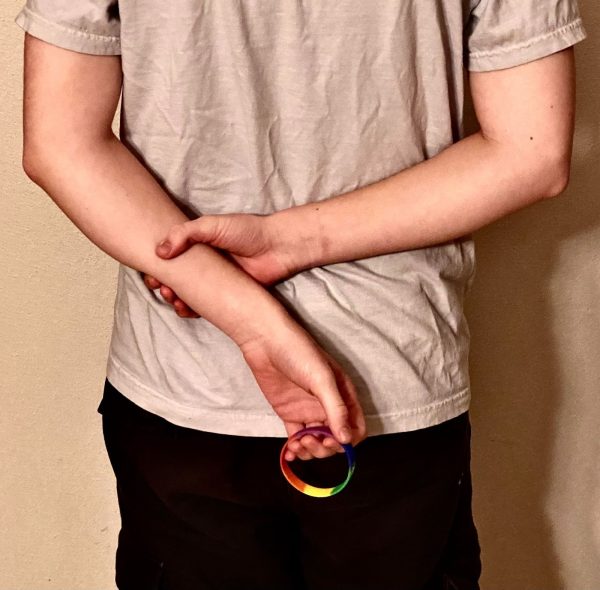
Picture this: Two girls shopping in a 2000s mall are chatting with each other. A girl in a pink shirt turns to a girl wearing a skirt as a top and asks, “Do you like this top?” The second girl replies, “It’s so gay.” The first girl looks crestfallen. “Really?” The second girl examines herself in the mirror while confirming, “Yeah, it’s totally gay.”
This is where Hilary Duff — award-winning star of “Lizzie McGuire” and general pop culture icon — steps in. “You know, you really shouldn’t say that,” she interjects.
The girls look at Duff in confusion. “Say what?”
Duff replies, “Well, say that something’s gay when you mean it’s bad. It’s insulting. What if every time something was bad, everybody said, ‘That’s so girl-wearing–a–skirt–as–a–top?’ The girl in pink looks at her friend and chuckles under her breath, “Oh, you are.” Duff adds, “Those are cute jeans, though,” before turning and beginning to walk offscreen. A slogan pops up with Duff’s narration: “When you say, ‘that’s so gay,’ do you realize what you say? Knock it off.”
In 2008, the Think Before You Speak campaign published a series of public service announcements aiming to end the normalized use of homophobic slang, especially among youth. People using the idea of queerness as an insult is nothing new, but casual homophobia has changed a lot since 2008 and goes beyond saying, “That’s so gay.” Those who don’t think of themselves as homophobic can still participate in casual homophobia, often unintentionally. Even allies and members of the queer community can buy into the normalization of homophobia without realizing it.
Aria Cole, a sophomore at Franklin who identifies as homoflexible — meaning that she is “mostly attracted to women … [but it’s] not exclusive” — says that she has seen many instances of casual homophobia at Franklin. “I often hear, mostly from younger boys, stuff like ‘no homo’ — which is meant to be a joke, but obviously is not,” Cole explains.
“No homo” is a phrase used to assert one’s heterosexuality after saying something that could be perceived as “homo,” or homosexual. On the surface, this type of language can seem harmless and even humorous, but on a deeper level, it reflects an aversion to being viewed as queer. People — typically cisgender, heterosexual men — use this phrase after things like simply giving a compliment or admitting interest in something that could be construed as feminine. It’s okay to be straight, of course, but this begs the question — why are people so afraid to be seen as feminine or queer?
For a long time, being accused of being queer was an insult of the highest degree. The word queer itself, before becoming a general term for the LGBTQ+ community, was a slur; queer was used in a similar manner as the f-slur is used in modern day. For some, queer still carries the weight and the pain of an insult, but in a broader sense, the word has been reclaimed as a label of LGBTQ+ intentionality and political action.
The reclamation of slurs is a recurring topic throughout queer history, and it is a facet of queer identity that remains hotly debated in the queer community today. Artemis Hagensen, a sophomore at Franklin who identifies as a transmasculine lesbian — a label he “[knows] is contradictory,” but that has “stuck with him” — says that for him, the reclamation of slurs is very powerful. “I reclaim slurs myself, as those words have been used to hurt me,” he explains. Cole adds, “I think reclamation of slurs can be good, if it is done in a way that respects queer history and [the words’] homophobic origins, but it can also be used as a way for people who are not in the community to normalize homophobia.”
The key detail of reclamation is reclamation — you must be queer to reclaim homophobic and transphobic slurs, otherwise it’s still just hatred. It’s not the place of someone who has never been repressed for their queer identity to reclaim slurs or dictate which slurs should be reclaimed. Even within the queer community, dictating who can use which slurs based on a person’s subjective label misses the point of slur reclamation entirely.
The reclaiming of slurs turns a formerly pejorative word into one of empowerment. On the other hand, some words that refer to queer people that initially weren’t slurs — such as gay and lesbian — have evolved into insults over the years.
You’ve probably heard the word twink before. It’s typically used to describe a skinny, feminine gay man, and is, in its true form, a neutral descriptor and a self-identifier. But recently, there has been an increase in online content describing so-called “evil twinks” — sometimes referring to a cruel gay man, but, more often than not, describing a straight woman’s ex disparagingly.
The phrase “evil twink” does sound funny, and you’re not a bad person for laughing along. But maybe we should consider why a straight woman labeling her ex a twink is thought to be so comedic. When you dig a little deeper, you’ll find that there actually shouldn’t be anything inherently funny or insulting about being a twink. The humor of calling your ex a twink stems from the implication that he is gay or feminine; it uses queerness as comedic material because it is easy to punch down.
From Cady Heron telling Janis Ian, “It’s not my fault you’re like in love with me or something!” in the iconic 2004 film “Mean Girls” to a freshman yelling, “No homo!” after complimenting his friend, casual homophobia can be found everywhere. Hagensen says that he notices casual homophobia “at least once a day” online or in school. Even in Portland, a city that is seen as one of the most LGBTQ-friendly places in the world, casually homophobic phrases frequently slip into our everyday language.
Being deliberate with word choice is the first step to deconstructing homophobia. To truly end the reinforcement of homophobia in our society, we need to be aware of the implications of our language. It’s not enough to simply be “not homophobic”; without actively choosing to interrogate the meaning behind our vocabulary, there is no breaking free of the deeply ingrained prejudice taught to us by a heteronormative society. Casually using homophobic language perpetuates a culture where queerness is the butt of the joke, always. And, in the wise words of Hilary Duff, we need to “knock it off!”



































